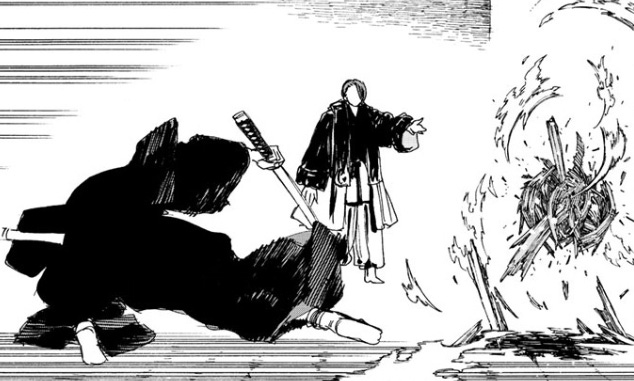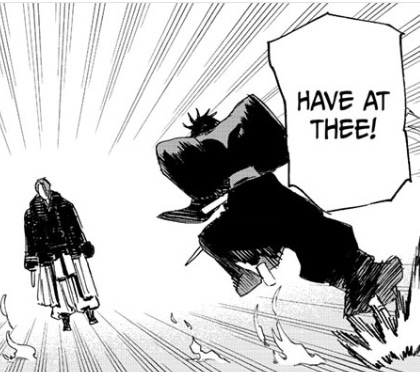Preface!
Folks, we have a new top spot holder in my search for the best manga, which wasn’t even a thing until now, and that spot is held by Hell’s Paradise. I’ve been jotting down notes incessantly, losing sleep as I stay up reading, and building entire craft lectures around elements of this manga.
It is, quite simply, perfectly balanced.
Yeah, I’m using the preface to gush, and nothing else really. What can I say, credit where it’s due. This story never quit.
Preface over. Hell’s Paradise Spoilers ahead!
There are a lot of things that are asked of storytellers that sound impossible. “Give us something that’s the same, but different.” What does that even mean? How can you have something that is both when the two are opposites? Of course, when you see it, you know it. Some stories just do it, but even that is subjective. What “does it” for one reader won’t for others. After all, there is no uniform way to tell a story.
Similarly, the notion of keeping readers guessing while also giving them enough sustenance and quantifiable plot points to keep them reading is not only a difficult task, but spread that over hundreds of chapters, as most manga reach, and you’re again nearing that word: Impossible.
Hell’s Paradise proves that it is not impossible, and they actually do it in a very simple way.
You have to establish deniability. The unexpected. Unpredictability. And you have to establish it early. There are lots of ways to accomplish this. For starters, if characters die with no predictable patterns, you cast doubt on who will and won’t survive. That becomes more difficult with protagonists and main characters, but not impossible.
More than that, though, what Hell’s Paradise does in keeping things unexpected is in mastering moments. That expertise is not won or lost in any given moment, though, it’s won or lost in the battles and interactions beforehand.
Let’s look at an example.
When Aza and Toma turn on the Tensen, there is a sustained tension all the way until the very last minute. There is plenty of evidence to support either of the two possible outcomes, without a definite predictable outcome. Up to this point, the brothers’ morality has been somewhere in the grey area. They could end up on either side. Yet in this moment, it’s been so perfectly weighted that, as readers, we’re waiting for the very moment they make their choice.
A big picture example: Gabimaru’s wife. All throughout the story, we are presented evidence for and against the existence of this dream life that Gabimaru is fighting for, where he has a loving wife. But in the moment where the truth is unveiled, the answer is not readily apparent until it’s right in front of us. Unpredictability.
Let’s talk some mainstream examples from the big three (Harry Potter, Star Wars, Lord of the Rings).
We all knew Luke was gonna destroy the Death Star because the alternative is the bad guys win.
We all knew Harry wouldn’t lose to Voldemort because the alternative is the bad guys win.
We all knew that the ring would be destroyed, because the alternative is the bad guys win.
These are all major moments that pack little surprises (Frodo refusing, Harry needing help to topple Voldy, Luke using the force) but the overall outcome is not surprising. We knew, before the pivotal moment, what would happen. It’s still enjoyable. Thrilling, even. But surprising? Not so much.
That said, those are all big picture plot moments. There are some side plots and moments that are unexpected in the mainstream as well. Remember when Draco stands down Dumbledore, prepared to kill him? That’s a moment where the outcome is not predictable. It could go either way. You can have inclinations one way or the other, but you can’t know.
Same goes with Snape or Gollum being good or bad. There’s so much evidence to both sides being possible that in the end, you have to wait for the big moment to know for sure what side either falls on. That’s what makes those moments so meaningful. You need evidence that supports both sides of the pivotal scenes. You have to leave it open to go either direction.
Hell’s Paradise wields an unmatched mastery of the moment. Of leaving suspension right to the last minute before a grand reveal.
Gantetsu—dying or not? They’ve established such a rhythm of unpredictability that you cannot know for sure. I will say that I never once, until the moment he makes it home, thought Gantetsu would survive the entire story. Not once.
Similarly… Yuzuhira—dying or not? She had a fake death and appears to be one of the few characters consciously aware that she may not make it.
Shugen—villain or not? I still don’t know, and I finished the series weeks ago.
And it’s highly likely that Yuji Kaku knew the power he wielded, because he even repeated patterns in a way to keep us even more off guard. Take for instance the death of my man Senta. Heartbreaking. That pattern repeats itself when Yuzuhira is suspected dead. She tells similar sentiments to herself and we see a “death scene” only for her to come flying back in later, against all odds.
Similarly, with Gantetsu and Fuchi. At this point, readers may be expecting one of the two to die. It only makes sense. Gantetsu is given some stellar opportunities to die… but he doesn’t. He keeps fighting. And as readers, we’re trying to puzzle this out—which of the two fits the story better? Perhaps you’re like me and you’re even thinking in terms of, which does the story need more?
I was gobsmacked that Fuchi died. Gobsmacked. And I don’t pull out that word often. Like I said, I would have bet money that Gantetsu was done for. But along with being unpredictable, it also isn’t out of the blue. Because there is a pattern of plausible deniability. A push and pull for every character to go either way. It’s so effective that it feels like Yuji Kaku himself didn’t even know if these characters were going to survive and made a split second decision.
Of course, that probably isn’t the case, but that’s how it feels, and that’s how it should feel. Look, I love drawn out battles, but when the outcome is predictable, I often find myself flipping through near deaths and banter, zipping to the resolution. Luffy isn’t going to die. Midoriya will always learn and improve.
There’s no skipping ahead in Hell’s Paradise because every moment is earned, every moment is unpredictable. It’s a masterclass of the minute, and I will forever cherish this story for all the good it did me as a storyteller, and all the ways it wrecked me as a human being.
For creative writers: Zoom in on your moments. How has the rest of your story supported pivotal moments and framed them?
For fans of Hell’s Paradise: Who were you most surprised didn’t die? And/or, who were you most surprised did die?








Hell's Paradise is insanely underrated. It clearly draws from manga like Demon Slayer, but manages to be completely unique in tone from the average battle shonen. Glad you gave it the respect it deserves.
I love this!! I am inspired to read this series now.
Josh- you have a fan in me!